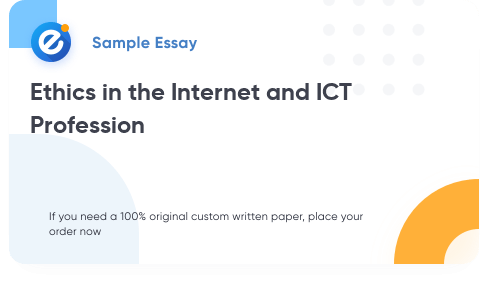
Ethical Consideration
Technology has become a new platform over which crime and other unethical acts are being perpetuated. One of the cyber technology features that is controversial from a moral perspective is the illegal interception of messages in transit. This comes in a form of eavesdropping or hacking into other companies’ websites. The case of the famous WikiLeaks editor Julian Assange proves that such activity is unethical. The act of intercepting messages provides threats to privacy of information transferred through or stored in the Internet. Political competitors attempt to gain access to the other party’s strategies, hence engage in this unethical act as well. The practice is also composed of the social element, since individuals may intercept private data for personal benefits such as blackmailing.
A conceptual muddle is the result of these issues. Technological advancement provides the possibility of this happening. Hackers, for instance, gain the knowledge which they may use in a wrong way. The result is obviously a policy vacuum since it is not predictable that such an invention will be successful. The legislation governing such inventions is not in place or is not sufficient to govern the sphere.
Calculate the cost of essay
According to a utilitarian evaluation of the scenario, Tim Smart should not have released his Internet worm. This is because the worm ends up causing much harm to the Internet by utilizing a lot of bandwidth. The intention was to seal the security loophole which it does not. The worm also automatically downloads and installs itself on the computer. Tim Smart also ensured that one cannot trace back the source of the worm.
According to Kant’s deontological evaluation, Tim Smart is justified to release the worm since his aim was to seal the security loophole. But basing on the virtue ethic-based evaluation of the scenario, individual’s ethics demands that one should be responsible for their actions. Tim Smart should have considered the effect the release of the worm would pose. If it would be beneficial, he would have to release it. If the release would likely cause harm to others, then it ought not to be released.
Is ICT a Profession?
I am not a believer that the field of information technology and communication (ICT) is at par with other professions like law and medicine. Despite IT being taught in tertiary education as a profession, no body of knowledge exists to govern the field. Furthermore, no update as to the advance in the career is geared towards this profession.
Limited Time
special offer
The second issue regards the profession’s autonomy. IT professionals are not recognized as individuals who are to be consulted and each individual acts on his/her own. To some extent, the knowledge of these individuals is outsourced if needed by an organization and no responsibility is bestowed upon them.
Of all the features of a professional body, the binding code of ethics really makes IT to be excluded as a profession. No code of conduct exists to govern the behavior of IT specialists. All professionals, however, are governed by a code of conduct agreed upon by members of that profession. Breach of such conduct is considered a crime and may lead to one being exterminated from the body.
It is worth noting that there is no formal organization to govern IT professionals. They are only specialized in what they do, but they cannot be referred to as professionals altogether. Their calling is urged by the need to be innovative but not by the history as is in other professions.
The culture of practice has been that of acting independently. Most IT specialists do not have a uniform rate to charge for the services they offer. For instance, one specialist would charge different from another specialist for the same service. They act independently of the other’s actions and are left to determine their own actions. Due to this, IT is not a profession but more of a specialty field in technology.

